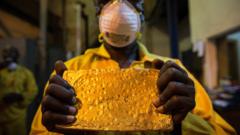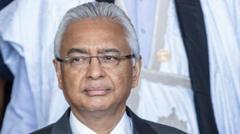In a significant turn of events, Mali has struck a deal with Australian mining company Resolute Mining wherein the latter will pay $160 million to resolve a tax dispute. This settlement comes on the heels of the unexpected detention of Resolute's British CEO, Terry Holohan, and two other employees, who were arrested while heading to Bamako for negotiations. The payment is structured with an immediate $80 million from the company's cash reserves, while the remaining sum is to be paid over the upcoming months.
Mali Secures $160 Million from Resolute Mining Amid Controversial Detention

Mali Secures $160 Million from Resolute Mining Amid Controversial Detention
Mali's military government reaches a settlement with an Australian mining firm following the detention of its British executives.
Mali is determined to enhance its revenue from foreign mining operators, especially considering its status as one of Africa's leading gold producers. The military government accuses the detained executives of forgery and damaging public property, signaling a tougher stance towards Western mining firms amidst the junta's foreign policy recalibrations since its coup in 2021.
With changes in local investment regulations implemented last year, which increased the maximum local stake from 20% to 35%, Mali's actions illustrate a strategic pivot to prioritize national interests in the lucrative mining sector. It remains uncertain when the detained Resolute staff will be released, as their freedom is tied to the execution of the memorandum of understanding alongside the initial payment.
The situation raises questions regarding the broader implications for international relations and the operational landscape for mining businesses in Mali, especially in light of the military government's apparent shift away from Western partnerships.
Overall, this incident delineates the growing tensions between foreign corporations and the evolving regulatory environment in Mali's critical mining industry.
With changes in local investment regulations implemented last year, which increased the maximum local stake from 20% to 35%, Mali's actions illustrate a strategic pivot to prioritize national interests in the lucrative mining sector. It remains uncertain when the detained Resolute staff will be released, as their freedom is tied to the execution of the memorandum of understanding alongside the initial payment.
The situation raises questions regarding the broader implications for international relations and the operational landscape for mining businesses in Mali, especially in light of the military government's apparent shift away from Western partnerships.
Overall, this incident delineates the growing tensions between foreign corporations and the evolving regulatory environment in Mali's critical mining industry.


















